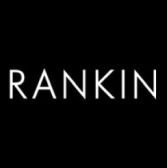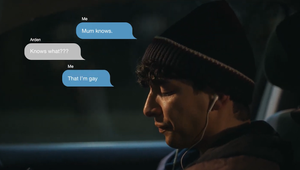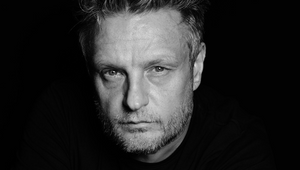
Rankin Gets Raw in Dusseldorf

Rankin’s collaboration with Walter Campbell and TBWA for Coco de Mer earlier in the year is one of the LBB team’s favourite pieces of work in 2015 so far, so the chance to catch up with him in Dusseldorf for the BBDO Regielounge was one LBB’s Matt Cooper just couldn’t turn down. The famed photographer and director might be most famous for his portraiture and fashion stills, but it’s in the world of moving pictures that his work gets really exciting. He’s shot music videos with everyone from Robyn to Tinie Tempah and when it comes to commercials he’s created everything from playful perfume ads to stylised stop motion for G-Star RAW. Plus with an upcoming Nike ad to look out for and his film production company nurturing exciting new talent and going from strength-to-strength, adland can’t get enough of his energy and style.
LBB> Since getting into moving imagery and building your profile as a commercials director, has that experience fed back into your stills work at all?
R> I’ve been directing since 1996 - I wanted to try it as early as possible in my career because I’ve always wanted to direct too. I did a short in 2003 and then a feature in 2006; those experiences actually changed everything about the way I work, from the treatments that I write, the way I pre-produce, the way that I collaborate with people, the way I utilise different departments. I always found it really strange when, at the start of the film, it says ‘this person’s film’ because it’s so not just their film. There are so many people involved. If you do a feature it’s like one big film school. And I don’t mean that it teaches you how to direct but it teaches you all of the other stuff that goes with it - how to schedule a day, how to get the best out of your crew.
LBB> Do you tend to work with one editor?
R> I used an amazing editor on the feature and I’d love to work with him more but he tends to only do features. In 2008 I hired in a young group who were fresh out of film school and I just let them develop. I use that team now to edit everything in-house. They’re fantastic. They’re all directing too and will go on to become fantastic directors.
I actually had a job where the client was adamant that should work with a Soho editor. But we did the job and my guy edited it and the client was really pissed off with the cut. I thought it was great but they were the creative and decided to take it to a Soho edit house, paid a lot more, and it was the same cut - because that’s all that was in there. I’m not underestimating editors; I’ve been in situations where I’ve recognised the need for a really, really good editor because of what they can bring to the party. But I also think it’s great to give these younger guys an opportunity.
LBB> We were big fans of your Coco de Mer project with TBWA. What are your memories of it?
R> I loved working on that because it was an opportunity to work with Walter Campbell, who I think is the most creative ‘creative’ in British advertising. I’ve worked with him before and he is one of my favourite people because he really pushes you in all the right ways.
It was a project that really came from Walter and a TBWA in-house editor, Nick Gilberg, who cut together a kind of mood board. When it was ready, he showed it to me and said, ‘oh, maybe we have something here…’. I told him straight away that it was just genius.
It’s a comment on society, it’s like holding up a mirror to the way we consume imagery. I said that the only way to make it happen was to combine loads of different photographers and voices, go out and shoot and then Nick puts it together. Walter was very specific and said he didn’t want any stills in the film. It all had to be moving image because he didn’t just want to reflect, he wanted to predict. I could have produced the film by myself but I knew that wasn’t the right way to approach it. It was amazing to work on. The most interesting thing about it, though, was that we actually took the idea to the brand and said it was right for them. I can’t stress how great it was to work with both Walter and Nick.
LBB> You also recently worked with Jelly on the GHOST Girl spot. How did you find incorporating animation into your work?
R> Well I really love Charlie [Sells, founder] from Jelly - it’s actually her I want to work with as opposed to the illustrators or the animators because she always brings such brilliant people to the party. The GHOST Girl spot had a really nice script for a perfume brand, which tend to be inherently boring. The girl was really interestingly cast - she is the authenticity of that ad and that brand. That’s so important when doing beauty because it’s drivel without it. It was a really good job actually.
LBB> You mentioned the mood board that Walter developed prior to the Coco de Mer project. Generally, are you a meticulous storyboard user or more spontaneous?
R> I hate storyboarding, I’m much more about outlining and working on set. But I work with people who are very meticulous storyboarders, which is good because I do think you need it. I like it when clients are very pedantic and particular because I know that I can give them what they want. So I tend to direct what’s on the storyboard but then add more of my own thing to it, and hopefully the client likes it.
LBB> Fashion film is an interesting genre because they’ve been around a while but it feels like they’re maturing now…
R> Definitely, I’ve just sat on a fashion film festival jury in Italy and can tell you that there are some really, really good directors out there right now doing some fascinating stuff. Like the music videos of the 1980s… some David Lynch style pieces, some Wes Anderson style.
LBB> You mentioned the feature you made back in 2006 - is that something you want to do again?
R> Yes I’d love to. Back in 2006 I wasn’t really ready to make a feature. It was very early in my career. I co-directed it with my mate and we just weren’t ready, we hadn’t done enough, hadn’t been on set enough, hadn’t done enough short form stuff. But I’d love to do it again now.
I’ve been running a short film programme for a couple of years. You learn so much from EP-ing and being on the board that decides which scripts are going to be made. There’s one feature by a guy who made one of those shorts that I really want to finance. So it’s more likely that I’ll exec stuff for the next few years; to direct your own feature you have got to find the right script and want to tell that story more than anything in the world.
LBB> Are there any brands or projects out there that you’d really love to get involved with?
R> I don’t really think about it like that. I’ve recently worked with Nike and I really enjoyed that. There’s a G Star job I’ve done too that I loved.
I remember Vaughan Arnell and his producer said that they would experiment with every single job, and that always stuck with me. It’s always good to try something new. And if you do want to produce long form in the end, you need to have that arsenal of abilities to allow you to do it, and that’s how I feel about doing commercial work. I’m always learning.










